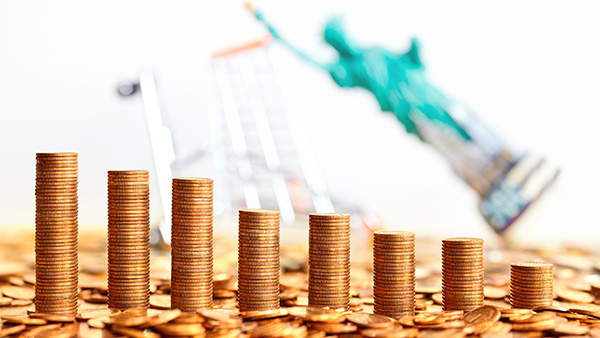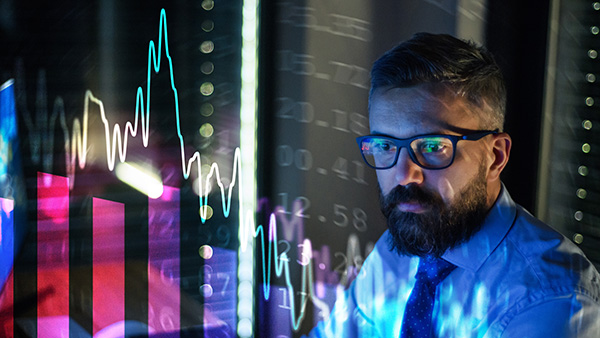Today’s economic boom; tomorrow’s bubble?
To Reduce Risk, hold Gold

In times of global uncertainty, investor and entrepreneur Ray Dalio is a proponent of reducing risk by adding gold to one’s portfolio. That view seems to be echoed by central banks across the world, as demand for gold among central banks hit a first-quarter record high in March 2023.
The Monetary Authority of Singapore (MAS) added 69 tons of gold to its reserves, an increase of 45% compared to the end of 2022. The People’s Bank of China (PBoC) added 58 tons over the quarter, making a total 2,068 tons of gold in its reserves, and Turkey added 30 tons of gold to its reserves.
As we noted before, gold has intrinsic value. The best evidence being the appreciation of gold observed over time. Over the last two decades, the purchasing power of gold has increased almost threefold, whereas the purchasing power of fiat currencies like the Dollar and the Euro have dropped by about 45% and 55% respectively.
Given that even banks are adding gold in times of uncertainty, following suit with your own portfolio certainly seems a smart move.
It Pays to be on Top
In his book, Principles for dealing with the Changing World Order, Ray Dalio elaborates further on the advantages of holding a reserve currency of the world.
When a country becomes the largest trading empire in the world, more countries accept transactions in its currency, making it a preferred medium of exchange. Because it is so widely used, that currency becomes a preferred store of wealth, thus the world’s leading reserve currency.
After that happens, other countries will gradually look to place deposits in the banks of the leading country to facilitate future transactions. Those deposits are then used in loans to other countries, and the cycle continues. This allows for great growth for the leading country, which swells to become an empire, albeit on the back of increased borrowing.
Given that none of these currencies are fully backed by assets of equal value, that’s a lot of paper going around. But because this is essentially backed by the world’s strongest country, everything continues to run; albeit mostly on good faith.
For decades, the world’s economy has been running on one unbacked promise leveraged on another.
Using Credit to Spark Growth
When a country ascends to be the leading power in the world, a period of peace and stability generally follows. This also sees a period of heightened development of the economy. That’s because periods of peace allow for better education, which sets the foundation for greater innovation and technological development.
As mentioned above, holding the world’s reserve currency translates to easier credit for the leading country. Part of this credit is loaned out as debt to its citizens. They then use this debt to produce goods and services, which are sold to other citizens. Many of these transactions don’t involve physical money but rather happen digitally via credit or debit cards. So, when a person sells his goods and services, he essentially converts his debt into loans to his buyers.
The process continues throughout the entire economy so that initial loan is multiplied many times, bringing back greater value in return. That’s noted as an economic boom and is seen when every new superpower takes advantage of its globally leading status.
Smart use of credit leads to increased productivity and economic growth.
All Good Things Come to an End

As Ray Dalio notes, every boom comes to an end.
Products from a leading country lose their competitiveness over time. Designs and technologies are copied. Foreign competitors hire talent from the leading country and match it with cheaper local talent to achieve the same results at a lower cost. Being priced in a weaker currency also means foreign competitor products cost less, so demand shifts away from the domestic product.
Growing up in more comfortable circumstances, future generations may also not work as hard as their predecessors, leading to less output overall. The law of diminishing returns also means that it gets harder to innovate with each subsequent cycle, so productivity inevitably dips.
Every boom period eventually hits a peak, followed by a decline.
The Cost of Unmet Expectations
As expectations of a better life grow, people may over-extend themselves to finance a lifestyle they cannot afford. Debt that doesn’t produce income only increases; exponentially so if the debtor can’t even repay the interest on the loan.
If he is unable to pay off the debt and defaults on his loan, he cuts spending. Because one’s spending is another’s income, this weakens the financial status of the people he deals with. That can lead to a ripple effect throughout the economy, eventually leading to a decrease in value of assets and a drop in spending.
More defaults means less capital for the banks to operate with, which means they themselves must be more prudent with their expenses. At its worst, this cycle cumulates in a run on the central bank of the country, forcing massive money printing which devalues the currency, taking the country down with it.
Prepare for Tomorrow Today
How does this relate to us today?
The United States of America is the current superpower, with trillions of dollars being held by countries over the world.
Consequently, the Dollar is the current World Reserve currency. The Dollar’s place as the global currency was further entrenched by the signing of the Bretton Woods treaty, when most countries pegged their currency to the US dollar rather than to gold.
The Federal Reserve reports that in 2020, the U.S. dollar accounted for 60.8% of currency banking claims and 57% of liabilities globally. That’s almost three times the next most used currency – the Euro.
That’s a large portion of the world's economy that stands to lose enormous value should the United States default on its liabilities.
That was already acutely felt during the implosion of the 2001 Dotcom bubble, and again during the 2008 Lehman Brothers crisis. The 2008 crisis in particular, saw households worldwide hit with a loss of income that didn’t recover until 2016.
In both cases, the Federal Bank narrowly avoided the worst-case scenarios by adding billions of dollars of liquidity to the banking system. Ray Dalio notes that the Federal Bank is moving to prevent recession yet again. China is also on the rise as a superpower, what he considers to be late Stage 5 and on the brink of Stage 6 in the “long-term order-disorder external cycle”.
If we are on the brink of yet another recession, it sounds like we would all do well to diversify early, and move to hold gold.